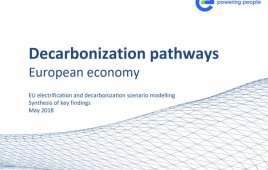As we strive to meet the ambitious targets set by the Paris Agreement, a recent study has shed light on a crucial aspect that demands our immediate attention – the electrification of at least 60% of the European Union’s economy. This groundbreaking research underscores the indispensable role that widespread electrification plays in mitigating climate change and achieving our collective environmental goals.
A Paradigm Shift towards Sustainable Energy
In order to effectively combat climate change, it is imperative that we transition from traditional fossil fuel-based energy sources to sustainable alternatives. The study reveals that achieving a minimum of 60% electrification across various sectors such as transportation, industry, and residential areas would significantly reduce greenhouse gas emissions and pave the way for a more sustainable future.
This paradigm shift necessitates an overhaul of existing infrastructure and policies to accommodate renewable energy sources like wind, solar, and hydroelectric power. By embracing these clean technologies on a large scale, Europe can not only decrease its carbon footprint but also foster innovation and economic growth in emerging green industries.
The Role of Transportation in Electrification Efforts
Transportation constitutes one of the largest contributors to global emissions. Therefore, prioritizing electric mobility is paramount if we are to achieve substantial reductions in greenhouse gas emissions. The study emphasizes that transitioning from conventional internal combustion engines (ICE) vehicles to electric vehicles (EVs) will be instrumental in reaching our electrification targets.
Furthermore, investing in robust charging infrastructure networks throughout urban centers and highways will alleviate range anxiety concerns associated with EV adoption while encouraging individuals to make environmentally conscious choices when it comes to their mode of transportation.
Redefining Industry Practices through Electrification
The industrial sector is another crucial area where electrification can yield significant environmental benefits. By replacing fossil fuel-dependent machinery and processes with electric alternatives, we can drastically reduce emissions associated with manufacturing and production.
Moreover, the study highlights that electrifying industries would not only contribute to decarbonization efforts but also enhance energy efficiency, leading to cost savings in the long run. This transition presents an opportunity for businesses to embrace sustainable practices while remaining competitive in a rapidly evolving global market focused on sustainability.
Conclusion
In conclusion, achieving at least 60% electrification of the European Union’s economy is an indispensable step towards realizing our commitments under the Paris Agreement. The study underscores that this ambitious target will require concerted efforts from policymakers, industry leaders, and individuals alike.
By prioritizing widespread electrification across sectors such as transportation and industry, Europe can lead by example in transitioning towards a low-carbon future. Embracing clean technologies not only mitigates climate change but also fosters economic growth and innovation within emerging green industries.


